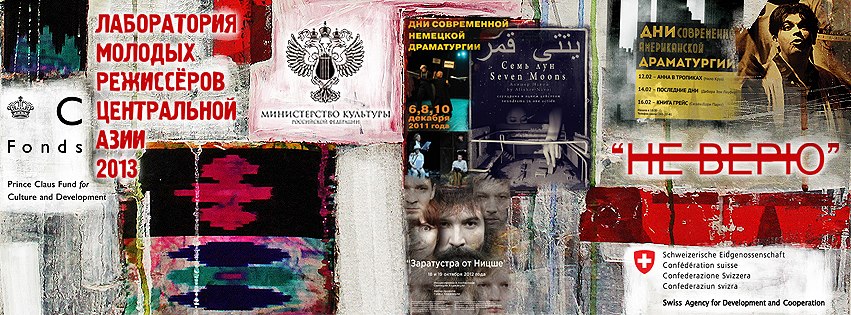
Лаборатория молодых режиссеров Центральной Азии
При поддержке
Швейцарского бюро
по сотрудничеству
в Узбекистане
«Лаборатория молодых режиссеров Центральной Азии» направлена на выявление, повышение уровня и практическую помощь в реализации творческих проектов молодых режиссёров, начинающих свой путь в профессии.
Реализация данного проекта помогает сохранить то, что накапливалось десятилетиями в практике профессионального театра, и, в частности, преемственность поколений, особенно в такой уникальной профессии, как режиссер. Единственный в прошлом высококвалифицированный театральный ВУЗ нашего региона – Ташкентский театральный институт – воспитал не одно поколение профессиональных режиссеров, работавших впоследствии на главных театральных площадках Центральной Азии. В настоящее время нет ни одного института, который выполнял бы функцию регионального центра подготовки театральных режиссеров. Между тем режиссёра как творческую личность формируют совместные сравнительные поиски и насыщенная среда, обмен информацией, преодоление замкнутого пространства. С 2004 года в Лаборатории прошли обучение 20 участников из Казахстана, Кыргызстана, Таджикистана, Туркменистана, Узбекистана.
В настоящее время многие участники Лаборатории успешно продолжают свою деятельность в профессии, и достигли высоких творческих результатов. Галина Пьянова (театр «Артишок», Казахстан, Алматы) является главным режиссером – постановщиком спектаклей своего театра, а также участником многих международных Фестивалей. Камат Касенов (Кыргызстан, Бишкек) работает режиссером в Кыргызском ТЮЗе. Талантбек Апыев (Кыргызстан, Ош) работает главным режиссером в Кыргызском Драматическом театре. Одна из его последних премьер – спектакль «Курманджан Датка» (автор пьесы Султан Раев). Антон Пахомов (Узбекистан, Ташкент) – выпустил свою первую режиссерскую работу в театре «Марка Вайля «Ильхом» – спектакль «Глиняные буквы, плывущие яблоки» по роману С. Афлатуни. Все они поддерживают тесный профессиональный контакт между собой и с театром «Ильхом».
Лаборатория молодых режиссеров стала постоянно действующим проектом, с периодически обновляющимся составом участников, с организацией очных сессий-семинаров. Лаборатория ставит перед собой задачу, нацеленную на создание насыщенной среды, обмена информацией, преодоление замкнутого пространства и совместных сравнительных поисков молодыми режиссерами. В процессе работы учебно-практических сессий удалось выявить способных молодых режиссеров и помочь им раздвинуть границы профессии, дать им возможность раскрыться и проявить свой творческий потенциал. Проект осуществляется в стенах театра Марка Вайля «Ильхом» и его школы драматического искусства. Уникальный опыт одного из самых интересных театров региона, его уровень и международный авторитет, позволили сделать программу Лаборатории интересной и насыщенной, постоянно действующей, привлекающей в качестве специалистов выдающихся театральных деятелей Узбекистана и зарубежья.
1, 2, 3 и 4 этапы Лаборатории
В 2005 году Программа по культуре и искусству Швейцарского бюро по развитию и сотрудничеству в Центральной Азии и ташкентский театр «Ильхом» начали осуществление проекта: «Лаборатория молодых режиссеров Центральноазиатского региона и Казахстана».
Лаборатория направлена на выявление новых имён, консолидацию нового поколения в регионе, создание условий для повышения их профессионального роста и практическую помощь в реализации творческих проектов молодых режиссёров, начинающих свой путь в профессии.
Осуществление данного проекта помогает сохранить то, что накапливалось десятилетиями в практике профессионального театра в пространстве бывшего СССР, и, в частности, восстановить преемственность в профессиональном опыте воспитания новых поколений режиссёров. Единственный в прошлом высококвалифицированный театральный ВУЗ региона – Ташкентский театральный институт – воспитал не одно поколение профессиональных режиссеров, работавших впоследствии на главных театральных площадках Центральной Азии, России, Казахстана и не только. В настоящее время в Центральной Азии нет ни одного института, который обладал бы уровнем компетентности и выполнял бы функцию международного центра подготовки режиссеров. Меж тем, личность режиссёра, творческого человека с широким взглядом на жизнь и профессию, формируют совместные сравнительные поиски и насыщенная среда, в которой происходит интенсивный обмен информацией, преодоление замкнутого пространства, а не изоляция, которая случилась после образования границ в традиционно едином пространстве СССР и, в частности, в регионе Центральной Азии.
Лаборатория нацелена на создание именно такой среды, которая и позволит выявить способных молодых людей, помочь им раздвинуть границы профессии, дать им возможность проявить свой творческий потенциал. Лаборатория проходит в стенах театра «Ильхом» и его Школы драматического искусства, во главе с художественным руководителем театра и Школы Марком Вайлем. Уникальный опыт этого, одного из самых известных театров региона, отмечающего в 2006 году своё 30-летие, его уровень и международный авторитет, позволяет делать программу Лаборатории интересной и профессионально эффективной, в планах – постоянно действующей.
Проект начал осуществляться в 2005 году в несколько этапов:
Подготовительный этап состоялся в ноябре 2004 г. – марте 2005 г. Во время него был составлен план организации и программы Лаборатории, проведена рассылка информации, анкетирование потенциальных участников и были организованы собеседования на местах.
Каждая из стран-участниц Центральной Азии и Казахстана располагала двумя грантами (двумя местами) в Лаборатории и одним коммерческим местом (т.е. оплачиваемым либо самим участником, либо стороной представляющей его).
В результате было получено 59 заявок. Из них:
- Казахстан – 9 заявок, отобрано- 2 участника
- Кыргызстан – 18 заявок, отобрано – на грант 2 участника, коммерческое обучение – 2 участника
- Таджикистан – 5 заявок, отобрано – 2 участника
- Туркменистан – 3 заявки, отобрано – 2 участника
- Узбекистан – 16 заявок, отобрано 6 участников, спец. проект – 2 участника
- Монголия – 6 заявок, отобрано на основе коммерческого обучения – 2 участника
В итоге в Лаборатории начали обучение 20 участников
Первый этап (очный):
Первая сессия и практические занятия проходили в апреле 2005 г., в течение одного месяца на базе театра и Школы драматического искусства театра «Ильхом». На первом этапе была выработана стратегия реализации персонального творческого проекта с каждым из участников Лаборатории.
В программе:
- мастер-класс с Юрием Авшаровым «Упражнения по методике Михаила Чехова»
- мастер-класс Марка Вайля «Метод анализа и интерпретации драматургии» (на примере «Гамлета» Шекспира и «Случая в зоопарке» Э.Олби)
- практические занятия по созданию атмосферы театра – среды, по освоению не стандартного театрального пространства для организации спектакля.
- мастер-класс В. Юрьева и Ш. Абдумаликова «Работа режиссёра со сценографией в современном театре»
- мастер-класс Артёма Кима «Работа режиссёра с музыкой в театре»
- мастер-класс Ю. Александрова, К. Артыкова «Тема и приемы театра в современном кино. Взаимовлияние и противостояние смежных искусств»
- Семинар по использованию видеоинстоляций и технических средств в современном театре
После первого этапа обучения была проведена аттестация. Участники, показавшие наиболее убедительный результат в практической работе и в мастер классах лаборатории, переводились на второй этап.
Второй этап (август – сентябрь 2005 г.): переписка, телефонные консультации с участниками Лаборатории, связанные с подготовкой индивидуальных проектов для следующего этапа.
Третий этап: вторая (очная) сессия и практические занятия лаборатории – проходили в октябре-ноябре 2005.
На этом этапе были разобраны и проанализированы режиссёрские планы каждого участника Лаборатории.
Их соединили с молодыми сценографами и под наблюдением педагогов были подготовлены эскизы и макеты по каждому проекту.
В их распоряжение были предоставлены студенты школы «Ильхома» и актёры театра для практической работы над отрывком или композицией по тексту, выбранного участником лаборатории творческого проекта.
Созданные фрагменты будущих проектов в течении двух дней были представлены зрителям и профессионалам на открытых показах и сопровождались демонстрацией эскизов и устным комментарием режиссера о замысле и представляемом отрывке.
На протяжении осенней сессии также проводились мастер-классы:
- Алексея Левинского «Биомеханика Мейерхольда»
- Елены Левинской «Новая драма. Имена и тенденции современной режиссуры»
В марте 2006 проходил четвертый (третий очный) этап проекта «Лаборатория молодых режиссеров Центральной Азии и Казахстана», осуществляемый совместно Швейцарским бюро по развитию и сотрудничеству и театром «Ильхом».
В нем приняли участие 7 молодых режиссёров: Талантбек Апыев, Камат Касенов из Киргизии, Захид Ашуров из Таджикистана, Юнус Курбанов, Зинаида Мелконян, Антон Пахомов из Узбекистана и Галина Пьянова из Казахстана.
Главной темой четвертого этапа Лаборатории стала тема «Искусство режиссёра: сочинение произведения для театра без пьесы» Лаборанты обсуждали и практически постигали опыт работы с:
- воображением;
- документом;
- фольклором;
- иконографией;
- поэзией.
Практической работой первой недели лаборатории стало выполнение задания по воплощению с актёрами инсталляции – импровизации по серии работ живописи и графики художницы Гули Громовой «Про любовь…». 8 марта 2006 в ташкентском театре «Ильхом» участники Лаборатории молодых режиссеров Центральной Азии и Казахстана показали зрителю воплощение этого задания.
В недельный срок – с 1 по 8 марта, участники Лаборатории освоили предложенный им иконографический материал, и нашли с актёрами, специально привлёчёнными для этого проекта, свое решение художественного эпизода – оживление картины. Практически в короткой – 2-5 минутной сцене, у каждого режиссера, с участием 1 или 2 артистов, должна была сложиться целая история жизни персонажей одного из полотен, представленных на вернисаже.
При достаточной сложности задания, каждый из участников Лаборатории успешно справился с поставленной задачей. Данная работа по-своему раскрыла возможности молодых режиссеров, как профессионалов, сумевших на практике убедиться, как можно работать без литературного текста, принимать нестандартное сценическое решение и находить сюжет и средства для его выражения в сжатой сценической форме.
На протяжении всего периода 4 семестра (с 1 по 16 марта) Лаборанты присутствовали на репетициях беспрецедентного в истории театров Центральной Азии проекта «Полеты Машраба» – создании спектакля без пьесы, основанном на синтезе: фольклора, поэзии, классической музыки Моцарта в исполнении народных восточных инструментов, а также привлечения документов – фото и видеоматериалов.
Участники Лаборатории впервые столкнулись с таким методом, как театральная реконструкция и интерпретация события на основе минимальной информации, с методикой включение ансамбля в создание импровизаций и воплощения фантазий на тему мифов и поэзии Машраба, ведущих, в конце концов, к созданию целостного сценического текста и спектакля.
Семинары-лекции Марка Вайля, проводимые по окончании каждой репетиции, практическая проверка предложений и вопросов лаборантов в их ходе, живой обмен мнениями позволили молодым режиссерам практически проверить возможности профессии режиссёра в отсутствии традиционной пьесы, что и было темой 4 семестра лаборатории. Уникальный опыт, с которым встретились её участники, без сомнения, позволил им повысить свою квалификацию и расширил познания в выбранной ими профессии.
4 семестр Лаборатории молодых режиссеров Центральной Азии и Казахстана можно считать успешным и продуктивным для всех отобранных для её участия лаборантов.
5 этап Лаборатории
(9 апреля – 12 мая 2007 г.)
Международная Лаборатория молодых режиссеров Центральной Азии и Казахстана продолжила свою работу при поддержке Фонда им. Эберта (Германия) и премии «Акция», вручённой Лаборатории Советом по культуре при Президенте Российской Федерации.
С 23 по 27 апреля 2007 на базе театра «Ильхом» состоялся мастер-класс доцента московского Высшего Театрального училища имени Б. В. Щукина Анны Бруссер и педагога Школа-студии МХТ им. Чехова Дмитрия Кошмина: «Обучение методике преподавания предмета «Сценическая речь».
Мастер-класс прохошел для студентов Школы драматического искусства театра и артистов театра «Ильхом», педагогов театрального института, дикторов радио и телевидения, участников Лаборатории молодых режиссеров Центральной Азии и Казахстана.
Привнесенный высококвалифицированными специалистами опыт и современные методики помогли профессиональному росту всех заинтересованных лиц, а также сориентировали начинающих педагогов в освоении педагогического мастерства.
Творческий процесс 5-й сессии Лаборатории базировался на процессе работы над текстом высокой классики, принадлежащим истории культуры и мирового театра – трилогией Эсхила «Орестея». В ходе Лабораторных занятий участники Лаборатории:
- провели сравнительный анализ 4-х переводов текста на русский язык;
- проанализирували законы композиции и работы над большими по формату, классическими литературными текстами;
- проведли семинары по вопросам современности звучания классического текста и путей его воплощения;
- традиционно приняли участие в мастер–классах специалистов по речи и пластике, связанных с непосредственной работой над «Орестеей» Эсхила;
- параллельно с этим лаборанты имели практическую возможность работать с актёрами над реализацией замысла. Для этого текст трилогии бул разбит на фрагменты, и участники Лаборатории стали ответственными за работу над закреплёнными за ними эпизодами.
6 и 7 этапы Лаборатории
Шестая и седьмая сессии Лаборатории прошли во главе с режиссером Овлякули Ходжакули. Уникальный опыт одного из самых интересных режиссеров региона, его уровень и международный авторитет, позволят сделать программу Лаборатории интересной и насыщенной.
С 17 августа по 25 сентября 2009 года (5 недель) Лаборатория молодых режиссеров Центральной Азии, организованная Театром Марка Вайля «Ильхом» и Швейцарским Бюро по сотрудничеству в Узбекистане, продолжила свою работу. На протяжении шестой-седьмой сессий организаторы проекта решили привлечь к работе Лаборатории совершенно новых участников, выбравших своей профессией труд режиссера. На этот раз программа сосредоточена в основном на привлечении молодых режиссеров провинциальных театров Узбекистана, хотя среди участников есть и молодые режиссеры из соседних стран (Казахстан, Туркменистан). Все они имеют начальную профессиональную подготовку, у большинства есть опыт самостоятельных постановок либо в учебных театрах, либо на профессиональных площадках. И все они подтвердили свое желание продолжить постижение профессии в рамках Лаборатории.
Расширение программы и «географии» Лаборатории делает ее более насыщенной и сложной. Резонанс, который получила Лаборатория с начала ее существования, вызвал широкий интерес в профессиональной среде. И именно поэтому организаторы, увеличивая количество новых участников, планируют создание профессиональной сети (network), где смогут встречаться, делиться полученным опытом, совместно участвовать в творческих проектах, как новые участники Лаборатории, так и участники первых ее сессий. Мечта организаторов – создать оптимальные условия для такого профессионального союза, а также обеспечить профессионально-творческую атмосферу путем привлечения специалистов высокого класса, использования высокохудожественного литературного материала.
Лаборатория даст им возможность принять участие в работе лучшего коллектива в Центральной Азии, с Мастером, зарекомендовавшим себя на международной театральной арене. Освоение как классического, так и современного авангардного драматического материала в рамках сессий Лаборатории – редкая возможность для молодого режиссера.
Лаборатория молодых режиссеров была и остается именно лабораторией творческих поисков и экспериментов.
Основой творческого процесса 6-ой и 7-ой сессий Лаборатории (17 августа – 25 сентября 2009 г.) стала работа над двумя пьесами. Первая пьеса – «Гамлет» У. Шекспира. Работа над пьесой «Гамлет» проходила с актерами театра Марка Вайля «Ильхом» (на русском языке) под руководством Мастера Лаборатории Овлякули Ходжакули. В ходе занятий участники Лаборатории приняли участие в постановочной работе над спектаклем «Гамлет». Лаборанты стали ассистентами режиссера-постановщика. А также лаборанты имели практическую возможность работать с актёрами над реализацией замысла спектакля (этюдный метод). Для этого текст пьесы бул разбит на фрагменты, и участники Лаборатории стали ответственными за работу над закреплёнными за ними эпизодами.
Вторая работа – проект «Легенды о Докторе Фаусте», в основе которого лежат народные истории о Фаусте, переложенные на современный язык молодым узбекским драматургом Женечкой Палеховой (на узбекском языке). Работа над данным проектом осуществлена совместно с актерами узбекских драматических театров под руководством Мастера Лаборатории Овлякули Ходжакули.
Итогом работы шестой и седьмой сессий Лаборатории стало повышение уровня и практическая помощь в реализации творческих проектов молодых режиссёров, начинающих свой путь в профессии и как следствие два открытых показа экзаменационных работ лаборантов.
Открытый показ лаборантов состоялся 21-го сентября 2009 года в 18.30 в Театре Марка Вайля «Ильхом».
Первая часть – отрывки из пьесы «Гамлет»
Вторая часть – отрывки из инсценировки Женечки Палеховой «Вокруг Фауста».
Лаборатория молодых режиссеров дает своим участникам уникальную возможность познакомиться с работой опытных профессионалов, перенять, трансформировать этот опыт и применить в своих собственных творческих работах на театральных площадка Центральной Азии.
8 ЭТАП ЛАБОРАТОРИИ
В 8 этапе «Лаборатории молодых режиссеров Центральной Азии», приняли участие режиссеры из Узбекистана, Таджикистана и Кыргызстана.
Мастером Лаборатории стал Владимир Панков (студия SounDrama, Москва).
Программа этого года была основана на практическом участии лаборантов в постановочном процессе Владимира Панкова. Она включала в себя: цикл лекций, семинаров, мастер-классов ведущих специалистов.
Педагоги Лаборатории:
Виктор Рыжаков – режиссер, педагог, художественный руководитель Театрально-культурного центра имени Вс. Мейерхольда, директор «Театрального фестиваля имени А. Володина», руководитель режиссерско-драматургических лабораторий «Новая драма», лауреат Российской Национальной театральной премии «Золотая Маска» (Москва).
Михаил Угаров – российский драматург, режиссёр и сценарист, участник оргкомитета и один из организаторов фестиваля молодой драматургии «Любимовка», художественный руководитель «Театра. DOC», художественный руководитель «Центра драматургии и режиссуры А. Казанцева и М. Рощина», руководитель семинара молодых драматургов, идеолог движения «Новая драма»
Елена Ковальская – арт-директор Фестиваля современной драматургии «Любимовка», известный театральный критик и эксперт. Окончила театроведческий факультет РАТИ (ГИТИС). Работала завлитом в театре «Школа современной пьесы». Была отборщиком и некоторое время директором фестиваля «Новая драма». С 1999 года является театральным обозревателем журнала «Афиша». Преподает историю зарубежного театра в РАТИ. Лауреат театральных премий «Дебют» и «Чайка», входит в число создателей Школы театрального лидера (Центр им. Мейерхольда).
Сроки проведения Лаборатории: 11-ое апреля – 23 мая 2013 года.
Проект был реализован благодаря поддержке:
Швейцарского бюро по сотрудничеству в Узбекистане
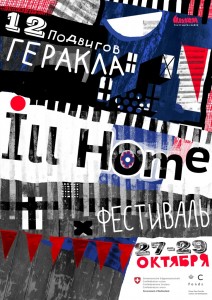 9 ЭТАП Лаборатории молодых режиссеров Центральной Азии 2014
9 ЭТАП Лаборатории молодых режиссеров Центральной Азии 2014
1- 30 октября ФЕСТИВАЛЬ “ILL HOME”
Место проведения: Театр Марка Вайля «Ильхом»
ОСНОВНОЙ ТЕМОЙ стал Site-specific theatre:
• Site-specific theatre: Режиссеры все активнее ищут альтернативные, не театральные пространства. В отличие от черной коробки сцены, у этих мест есть свое настроение, своя память. Они хранят в себе разные истории – и спектакли находят способы их оживить. Место определяет всё – постановка буквально «вырастает» из его микроклимата, архитектуры и назначения. Главная задача site-specific – разрушать привычное представление о театре. Публика не просто наблюдает за происходящим. Она неизбежно попадает в «эпицентр» событий и становится частью спектакля. Место диктует свои правила поведения, с которыми участники должны согласиться и безоговорочно их соблюдать. Зрители вынуждены перемещаться в незнакомом пространстве, ориентироваться в непредвиденных ситуациях и взаимодействовать с актерами, порой даже брать инициативу на себя. Обычно спектакли site-specific неотделимы от места, в котором они создаются. Это единственный контекст, в котором они понятны.
(27-29 октября) — прошел фестиваль «Ill Home», под лозунгом: «Театр — вокруг нас. Театр – в нас». На нем молодые режиссеры вышли за рамки привычного театрального пространства: и взялись за освоение новой территории – не сцены, а неадаптированной площадки. Фестивальный показ этюдных работ лаборантов прошел на заброшенной галерее (над театром «Ильхом»). Общая площадь – 2000 кв. метров.
Педагоги и кураторы Лаборатории из Узбекистана:
театроведы, арт-менеджеры, сценографы, музыканты, актеры и режиссеры: Борис Гафуров, Шухрат Абдумаликов, Мухаббат Туляходжаева, Сухроб Назимов, Thibaut de Ruyter (Германия)
Режиссеры из России: Женя Беркович, Юрий Квиатковский, Ксения Петренко
Проект осуществлен при поддержке Швейцарского бюро по сотрудничеству в Узбекистане и Фонда Принца Клауса (Нидерланды).
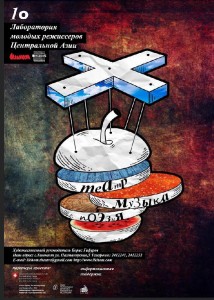
10 ЭТАП Лаборатории молодых режиссеров Центральной Азии 2017 года: Театр, Музыка, Поэзия.
(20 сентября — 20 октября)
Мастер Лаборатории — Владимир Панков (студия SounDrama Москва).
Музыкальный руководитель — Артем Ким (ансамбль OMNIBUS, Ташкент).
Экспериментальная работа в комбинировании театра, музыки и хореографии. Основой художественного материала стала пьеса в стихах «Федра» (Марина Цветаева).
Основные темы:
• Театр. Музыка. Поэзия: 10-я Лаборатория связана с постановкой спектакля по поэтической пьесе Марины Цветаевой «Федра». Во время создания спектакля режиссером-постановщиком Владимиром Панковым, совместно с музыкальным руководителем Артемом Кимом, в театре «Ильхом» проходил учебный процесс для участников. Лаборанты присутствовали и принимали участие на всех процессах создания спектакля, от концептуального замысла и репетиций до выпуска спектакля. Формат обучения включил в себя анализ репетиционного процесса, ежедневное обсуждение репетиций, метода и материала с Мастером Лаборатории и Музыкальным руководителем. Способность понимать и воплощать синтез театральной постановки и живых музыкантов, хореографического решения поэтического текста – вот то, чем должны были овладеть лаборанты в процессе работы.
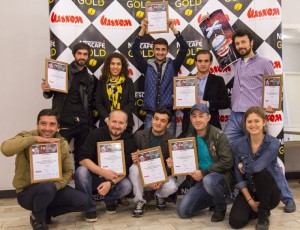
Принцип работы 10 Лаборатории основан на МКК (Метод коллективной композиции). Вместе с ансамблем OMNIBUS Артем Ким создает «Метод коллективной композиции» (МКК) — уникальную систему организации творческого процесса, в основе которой лежит идея создания произведения искусства коллективом авторов, одновременно являющихся исполнителями этого произведения. Метод предлагает конкретные механизмы управления творческим процессом, как индивидуальным, так и коллективным, на всех этапах — от возникновения первоначальной идеи до структурного завершения художественного произведения.
Во многом МКК переосмысливает роли не только авторов и исполнителей произведения искусства — режиссера, композитора, актера, музыканта, но и самой аудитории — зрителя и слушателя. МКК включает в себя практики (упражнения, тренинги, игры и прочее), которые учат чувствовать энергетические и информационные потоки, и управлять ими. Практики направлены на развитие интуитивного чувства ансамбля и структуры, способности к спонтанной импровизации, умения физически и эмоционально концентрироваться и расслабляться в процессе индивидуального и коллективного творчества. Каждому участнику был предоставлен поэтический материал для работы в Лаборатории МКК.
Каждый участник создал группу из 2-х-3-х актеров театра «Ильхом» и 2-3-х музыкантов. Учебный показ на зрителя результатов работы МКК – состоялся 14 октября 2017 года
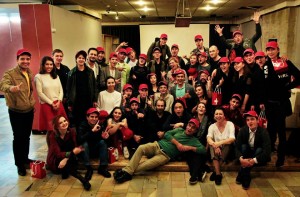
Педагоги, кураторы из Узбекистана:
Музыканты, актеры и режиссеры: Борис Гафуров, Джахонгир Шукуров, Артем Ким, Сухроб Назимов. (Театр «Ильхом», ансамбль OMNIBUS).
Режиссеры, сценографы, хореографы и театроведы из России:
Владимир Панков, Студия SounDrama (Москва)
Сергей Агафонов, Студия SounDrama (Москва)
Вероника Насальская Театр БАТА (Алматы)
Полина Миронова, Центр драматургии и режиссуры (Москва)
Елена Ковальская, Центр им. Вс. Мейерхольда (Москва)
Официальный партнер: СТД РФ
Совместно с: ансамбль OMNIBUS (Ташкент)
студия SounDrama (Москва)
Проект был реализован благодаря поддержке: Швейцарского бюро по сотрудничеству в Узбекистане
11 ЭТАП Лаборатории молодых режиссеров Центральной Азии
прошел с 15-30 СЕНТЯБРЯ 2019 г. совместно со «Школой театрального лидера», действующей на базе Центра им. Вс. Мейерхольда. Москва.
Концепция Лаборатории 2019 года: творческий тандем режиссера и арт-менеджера.
Впервые для участия в Лаборатории были приглашены арт-менеджеры и директора театров, готовые работать в тандеме с театральными режиссерами.
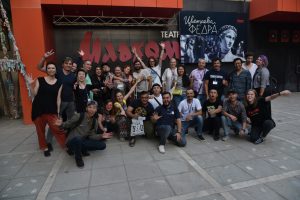
Руководитель:
Елена Ковальская, арт-директор Центра им. Вс. Мейерхольда, Москва руководитель «Школы театрального лидера»
Кураторы:
Роман Феодори, Художественный руководитель Красноярского театра юного зрителя. Руководитель творческих и социокультурных проектов: ежегодная Лаборатория актуальной драматургии и режиссуры «Вешалка», драматургическая лаборатория для подростков «ClassAct», проект с участием слабослышащих детей «Человеческий голос»
Елена Тупысева: директор театра «Балет Москва» (Москва). Стратегическое планирование.
Анастасия Патлай: режиссер Театра.doc (Москва). Независимый театр в России. Мастер-класс по
Анастасия Тарасова: директор театра ARTиШОК (Алматы). Независимый театр в Центральной Азии.
Екатерина Бондаренко: драматург, танц-драматург, перформер, документалист (Москва)
Кураторы из Узбекистана:
Борис Гафуров – художественный руководитель театра «Ильхом»
Ирина Бхарат – заместитель директора театра «Ильхом», креативный продюсер
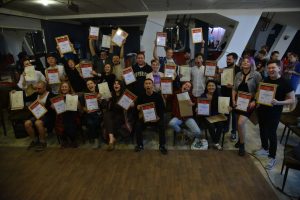
Основные темы и программа:
• Искусство управления театром (15-20 сентября. Роман Феодори)
• Независимый театр (20 сентября. Борис Гафуров, Ирина Бхарат, Елена Ковальская)
• «Театр горожан» (21 -23 сентября. Екатерина Бондаренко – Гацалова)
• ARTиШОК: Развитие независимой площадки и компании в Казахстане.
• Художественная программа и маркетинг (22 сентября. Анастасия Тарасова)
• Пост колониальные исследования в театре (23 сентября Елена Ковальская)
• Документальный театр (24 – 30 сентября. Анастасия Патлай)
• Бизнес-игра «Путь клиента» (24 сентября, Елена Ковальская)
• Работа с реальностью и работа с памятью (25 сентября, Анастасия Патлай)
• Стратегическое планирование компании: видение, миссия, анализ компании.
SWOT, TOWS анализ, «Бостонская матрица», финансовый план; определение каналов финансирования, маркетингов; план развития аудитории (21 – 30 сентября. Елена Тупысева, Елена Ковальская)
• Определение целевой аудитории; художественная программа; календарный план ( 28-29 сентября, Елена Ковальская, Ирина Бхарат, Борис Гафуров)
• Защита проектов участниками Лаборатории
23 сентября, состоялся закрытый показ участников Лаборатории молодых режиссёров, итог работы в мастер — классе Екатерины Бондаренко «Театр горожан».
30 сентября состоялся показ итогов Лаборатории молодых режиссёров ЦА в рамках мастер-класса Анастасии Патлай «Документальный театр» — «Иногда я летаю»
Лаборатория прошла при генеральной поддержке Швейцарского Бюро по сотрудничеству при Посольстве Швейцарии в Узбекистане.
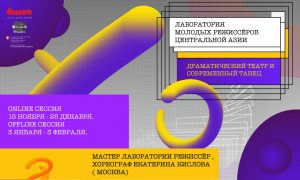
12 ЭТАП Лаборатории молодых режиссеров Центральной Азии «Драматический театр+ современный танец» прошел с ноября 2021 года по февраль 2022
Лаборатория состояла из двух сессий:
Он лайн сессия: 15 ноября — 25 декабря 2021 г.
Офф лайн сессия: 3 января — 3 февраля 2022 г.
Программа Лаборатории:
В этот раз Лаборатория молодых режиссеров строилась на работе молодых режиссеров, хореографов, композиторов и музыкантов в драматическом театре, с драматическими актерами.
Мастер Лаборатории – режиссер-хореограф Екатерина Кислова (Москва)
Музыкальный руководитель проекта – Артем Ким
Художественный руководитель театра – Борис Гафуров
Продюсер проекта – Ирина Бхарат
Режим работы: Ежедневная индивидуальная работа с лаборантами над их материалом на основе пьесы «Танец Дели» ( рабочие группы: актеры и студенты театра «Ильхом», музыканты и композиторы, танцоры). Репетиции проекта «Танец Дели» (по мотивам пьесы Ивана Вырыпаева). Спектакль вошел в репертуар театра «Ильхом».
Тренинги и мастер-классы:
по хореографии,
работа с театральным пространством,
невербальные способы выражения
тандем «режиссер + хореограф + композитор + актер»
метод коллективной композиции (МКК)
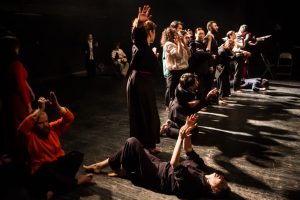
Мастер Лаборатории:
ЕКАТЕРИНА КИСЛОВА — лауреат Национальной театральной Премии «Золотая Маска», педагог современного танца, хореограф. В 1996 г. окончила Челябинский государственный институт культуры по специальности преподаватель хореографических дисциплин. 1996-1997 г.г. — преподаватель классического танца кафедры хореографии Челябинского колледжа культуры.
Является хореографом постановок SounDrama и ЦДР (Москва): «Однорукий из Спокана», «Клятвенные девы», «Кеды», «Москва – открытый город. Переход», «Птишка», «Дневник Алёны Чижук, а ещё почта, жж и фейсбук», «Загнанных лошадей пристреливают, не правда ли?», «Обломoff». Куратор хореографической лаборатории Центра драматургии и режиссуры. Хореограф-постановщик спектакля «Девъ». Хореограф режиссерско-композиторской лаборатории «Акустическая читка».
Принимала участие в создании спектаклей «Зойкина квартира» (М.Булгаков), «Война» по произведениям Р. Олдингтона «Смерть героя», «Илиада» Гомера и «Записки кавалериста» Н. Гумилева, «Двор» Е. Исаевой, «Машина» Ю. Клавдиева, «Морфий» по рассказу М. Булгакова и др. Режиссер-постановщик спектаклей «Едоки» по творчеству Ван Гога и «Общежитие».
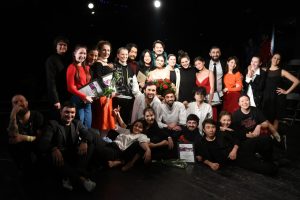
Музыкальный руководитель Лаборатории:
Артем Ким — композитор, дирижер, организатор и художественный руководитель первого в Центральной Азии ансамбля современной музыки «Omnibus», объединивший в своем творчестве традиционные звукоряды (макомы) Центральной Азии с традициями и языком современной музыки. Художественный руководитель ансамбля Артём Ким получил Приз Фонда Ага Хана в области «Образовательная деятельность» из рук Ага Хана, Президента Португалии Марчело Риберо и Принца Амина Ага Хана.
В рамках нашей Лаборатории участники учились соединять текст с музыкой и пластикой. Это первая Лаборатория в ЦА, посвященная совместной работе режиссера, хореографа и композитора. А также дающая возможность каждому попробовать себя сразу во всех этих творческих специальностях. Основным направлением исследования стал импровизационный метод в музыке, в современном танце и театре, создание музыкальной партитуры и партитуры спектакля непосредственно во время репетиционного процесса.
Междисциплинарная программа позволяет изучать новые формы музыкально-хореографического драматического театра, а также новые способы взаимодействия режиссеров, хореографов и композиторов во время репетиционного процесса. Результатом лаборатории стал полноценный спектакль, состоящий из музыкально-театральные эскизов.
Открытый показ Лаборантов состоялся на сцене театра «Ильхом» 29 января 2022 г.
3-4 февраля – состоялась премьера спектакля «Танец Дели».
Генеральная поддержка проекта — Швейцарское Бюро по сотрудничеству при Посольстве Швейцарии в Узбекистане.



